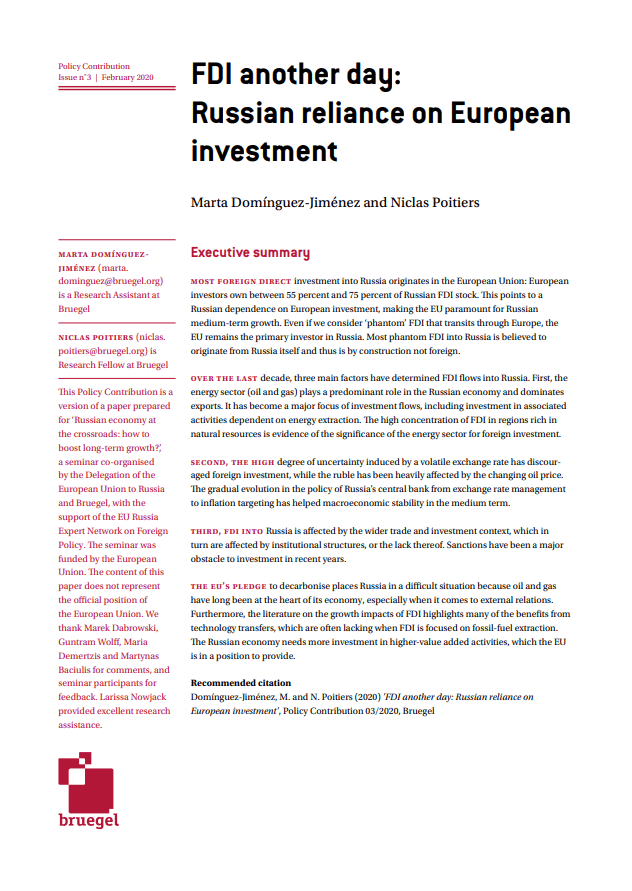Policy Contribution
FDI another day: Russian reliance on European investment
Most foreign direct investment into Russia originates in the European Union: European investors own between 55 percent and 75 percent of Russian FDI stock. This points to a Russian dependence on European investment, making the EU paramount for Russian medium-term growth. Even if we consider ‘phantom’ FDI that transits through Europe, the EU remains the primary investor in Russia. Most phantom FDI into Russia is believed to originate from Russia itself and thus is by construction not foreign.
This Policy Contribution is a version of a paper prepared for ‘Russian economy at the crossroads: how to boost long-term growth?’, a seminar co-organised by the Delegation of the European Union to Russia and Bruegel, with the support of the EU Russia Expert Network on Foreign Policy. The seminar was funded by the European Union. The content of this paper does not represent the official position of the European Union. We thank Marek Dabrowski, Guntram Wolff, Maria Demertzis and Martynas Baciulis for comments, and seminar participants for feedback. Larissa Nowjack provided excellent research assistance.
Over the last decade, three main factors have determined FDI flows into Russia. First, the energy sector (oil and gas) plays a predominant role in the Russian economy and dominates exports. It has become a major focus of investment flows, including investment in associated activities dependent on energy extraction. The high concentration of FDI in regions rich in natural resources is evidence of the significance of the energy sector for foreign investment.
Second, the high degree of uncertainty induced by a volatile exchange rate has discouraged foreign investment, while the ruble has been heavily affected by the changing oil price. The gradual evolution in the policy of Russia’s central bank from exchange rate management to inflation targeting has helped macroeconomic stability in the medium term.
Third, FDI into Russia is affected by the wider trade and investment context, which in turn are affected by institutional structures, or the lack thereof. Sanctions have been a major obstacle to investment in recent years.
The EU’s pledge to decarbonise places Russia in a difficult situation because oil and gas have long been at the heart of its economy, especially when it comes to external relations. Furthermore, the literature on the growth impacts of FDI highlights many of the benefits from technology transfers, which are often lacking when FDI is focused on fossil-fuel extraction. The Russian economy needs more investment in higher-value added activities, which the EU is in a position to provide.
Recommended citation
Domínguez-Jiménez, M. and N. Poitiers (2020) ‘FDI another day: Russian reliance on European investment‘, Policy Contribution 03/2020, Bruegel













